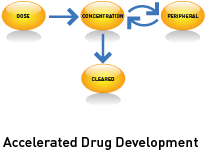Rosa & Co, LLC

Selected Case Studies
First-in-Kind Biodefense Drug Modeling
A pharmaceutical company developing a biodefense drug to treat individuals infected with a highly fatal organism ran into a daunting problem: the drug, which must be approved for use in humans, cannot be tested in humans because a) it would be grossly unethical to deliberately infect individuals with the highly fatal organism, and b) waiting to test the drug until there are victims of a biological attack would defeat the purpose of developing the drug.
- During the late-stage preclinical phase of the program, Rosa’s models and simulations were the basis for determining the necessary human dose relying on efficacy data from the different animal species and human pharmacokinetic data (as required by the FDA).
- During this project, Rosa developed a pioneering methodology for modeling biodefense drugs that explicitly represents physiological components, accounting for critical factors never before addressed in published models.
- By systematically representing key physiologic relations, the team was able to accurately and understandably scale effective doses from animals to humans and clearly document the basis for such scaling by explicitly incorporating a wide range of data from the literature into the model.
- The physiologic representation enabled Rosa to model the effects of adjuvant therapy so that trade-offs among dose and various adjuvant treatment strategies could be accurately analyzed.
Phase II-III Trial for a Novel Asthma Drug
For an emerging pharmaceutical company undertaking Phase II-III trials for a drug to treat acute severe asthma episodes, Rosa:
- Modeled key interactions among trial compounds and a coadministered standard of care from both efficacy and safety perspectives;
- Showed that a proposed Phase IIa trial would not be informative;
- Suggested that the client modify proposed doses and regimens in a planned Phase IIb trial;
- Identified the key importance of a common analyte to understanding response variability – a relation not previously reported in the literature;
- Devised an adaptive protocol to identify safe doses;
- Suggested that the client move subjects from active arms to the placebo arm to increase the information content of a proof-of-concept trial; and
- Showed that proceeding directly to Phase III without another Phase IIb trial was warranted.
Line Extension Trial for a Popular Analgesic Program
For a pharmaceutical company about to undertake a Phase IV analgesic program, Rosa:
- Developed models that dealt with decreased drug effectiveness over time (i.e., drug accommodation) and complex placebo effects in the context of a cross-over study design;
- Explained the significant differences that were observed in several study results of both active and placebo arms;
- Assisted our client in appropriately using data from an approved indication to extend product’s label into a new indication; and
- Contributed to the preparation of our client’s FDA dossier.
Learn More
Contact us today to learn more about our PK/PD modeling and clinical trial simulation services.
